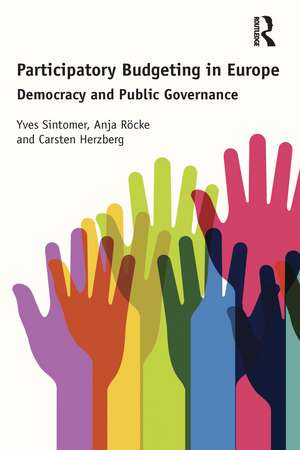Participatory Budgeting in Europe: Democracy and public governance
Autor Yves Sintomer, Anja Röcke, Carsten Herzbergen Limba Engleză Paperback – 30 iun 2021
| Toate formatele și edițiile | Preț | Express |
|---|---|---|
| Paperback (1) | 318.29 lei 3-5 săpt. | +20.05 lei 10-14 zile |
| Taylor & Francis – 30 iun 2021 | 318.29 lei 3-5 săpt. | +20.05 lei 10-14 zile |
| Hardback (1) | 767.88 lei 6-8 săpt. | |
| Taylor & Francis – 18 mar 2016 | 767.88 lei 6-8 săpt. |
Preț: 318.29 lei
Nou
Puncte Express: 477
Preț estimativ în valută:
60.90€ • 63.76$ • 50.39£
60.90€ • 63.76$ • 50.39£
Carte disponibilă
Livrare economică 15-29 martie
Livrare express 04-08 martie pentru 30.04 lei
Preluare comenzi: 021 569.72.76
Specificații
ISBN-13: 9781032097992
ISBN-10: 103209799X
Pagini: 268
Ilustrații: 10 Illustrations, black and white
Dimensiuni: 156 x 234 x 14 mm
Greutate: 0.39 kg
Ediția:1
Editura: Taylor & Francis
Colecția Routledge
Locul publicării:Oxford, United Kingdom
ISBN-10: 103209799X
Pagini: 268
Ilustrații: 10 Illustrations, black and white
Dimensiuni: 156 x 234 x 14 mm
Greutate: 0.39 kg
Ediția:1
Editura: Taylor & Francis
Colecția Routledge
Locul publicării:Oxford, United Kingdom
Cuprins
Chapter 1. ‘It all began in Porto Alegre…’
Chapter 2. European convergence?
Chapter 3. Six participatory models
Chapter 4. Porto Alegre in Europe? (Spain and Italy)
Chapter 5. ‘Proximity democracy is in the air’ (France)
Chapter 6. Proximity: Springboard or trap? (Belgium, Portugal, Netherlands)
Chapter 7. Participatory modernisation (Germany and Finland)
Chapter 8. Between community development and public–private partnerships (United Kingdom, Poland)
Chapter 9. Public services serving the public?
Chapter 10. An instrument of social justice?
Chapter 11. Democratizing democracy?
Notă biografică
Yves Sintomer is professor for political science at Paris 8 University, and Senior Fellow at the Institut Universitaire de France. He is visiting professor and associated researcher at Neuchâtel University, Lausanne University and Bask Country University. He is doctor of political and social sciences (European University Institute, Florence) and works in a research supervision capacity (Paris 5 University).
Anja Röcke is Assistant Professor of Sociology at the Institute for Social Sciences at Humboldt University, Berlin. She studied in Berlin and Paris and achieved her doctoral degree at the European University Institute in Florence.
Carsten Herzberg is Senior Researcher at the nexus Institute a think tank for participatory politics and cooperation management in Berlin. He studied Political Science and holds a German-French PhD.
Anja Röcke is Assistant Professor of Sociology at the Institute for Social Sciences at Humboldt University, Berlin. She studied in Berlin and Paris and achieved her doctoral degree at the European University Institute in Florence.
Carsten Herzberg is Senior Researcher at the nexus Institute a think tank for participatory politics and cooperation management in Berlin. He studied Political Science and holds a German-French PhD.
Recenzii
’While there is agreement that democratic institutions need to be changed, the ways in which participation and representation could be combined vary. Covering the several ways in which participatory budgeting is implemented in different countries, this volume is extremely useful in understanding the many promises, but also the many challenges of democratic innovations.’ Donatella della Porta, European University Institute & Scuola Normale Superiore, Italy ’This revised version of a book originally published in French and other European languages is a much anticipated contribution to the literature on participatory budgeting. Written by three respected figures within the field, the book offers a nuanced and insightful analysis of the varied trajectories of participatory budgeting across Europe and the implications this has for realising social justice and democratising democracy.’ Graham Smith, University of Westminster, UK
Descriere
Can participatory budgeting help make public services really work for the public? Incorporating a range of experiments in ten different countries, this book provides the first comprehensive analysis of participatory budgeting in Europe and the effect it has had on democracy, the modernization of local government, social justice, gender mainstreamin








